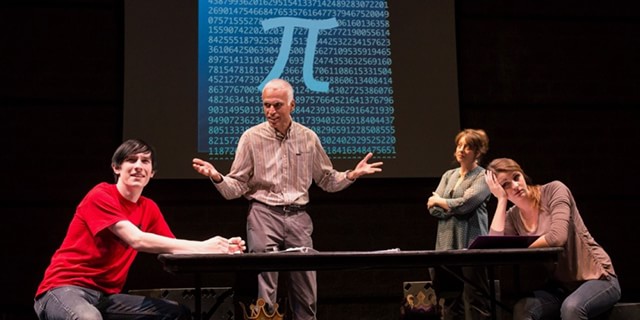Math & Humanity

Manil Suri (S'80, '83) and Michele Osherow (DC'88) didn't expect that their academic careers would lead to them performing around the country.
Suri, a math professor at the University of Maryland, Baltimore County (UMBC) and Osherow, an associate professor of English at UMBC, co-wrote "The Mathematics of Being Human," a play that embodies the experience they had co-teaching a course on math and literature.
The two connected in 2009 when Osherow, the resident dramaturg at the Folger Theatre in Washington, D.C., asked Suri, who is also a novelist, to talk to the cast about the math in Tom Stoppard's "Arcadia." It led to Suri giving a series of lectures, which garnered audiences of over 100 people.
"That said to me that there is a real need for someone to explain math. Typically you can't partake of mathematics like you can of music or art," said Suri, who studied mathematics at Carnegie Mellon University.
After the experience, Osherow suggested that they team teach a freshman seminar: "Mathematics and What It Means to Be Human."
"I had never been a math person," Osherow said, who double majored in Literary and Cultural Studies and Professional Writing. "My father tried to get me into math and I resisted with all my heart. But Manil made it accessible."
The course explained how the disciplines related to each other, and fostered a three-part article for The Chronicle of Higher Education, which led to an offer to discuss the experience at St. Jerome's University.
Instead of a lecture, they performed a play where they poked fun at themselves as two professors trying to merge teaching styles and the challenges of relating their content. The play also explained Shakespeare's use of the word "nothing" 29 times in "King Lear" (the concept of zero was just becoming mainstream while Shakespeare was writing the play), and suggested that form is the mathematics of poetry.
"We're trying to suggest that interdisciplinary teaching is extremely hard — there's something to pushing yourself beyond your comfort zone," Osherow said.
Osherow and Suri were pleased at how well the play was received at St. Jerome's, and planned to develop it further and perform it at UMBC.
Their performances were standing room only.
"I was terrified that people would think I wasn't representing my discipline well. But from the first second people started laughing. I knew they got the parody," Osherow said. They had a similarly appreciative reaction in San Antonio, where they performed the play in front of an audience of 350 mathematicians.
Osherow started teaching at UMBC 13 years ago and was at a campus meeting when she learned that CMU was UMBC's role model. She was excited.
"I felt that all the professors I had at CMU were so invested in my learning," she said. "They made me never want to leave the classroom."
Recently UMBC President Freeman A Hrabowski mentioned Osherow and Suri's play while speaking as part of CMU's Simon Initiative Distinguished Lecture series.
"When I mentioned it to colleagues last night, they said 'That's the kind of thing we do, the idea of interdisciplinary,'" Hrabowski said. "However, it's not often that you hear about the mathematics of being human."
Suri and Osherow will be performing "The Mathematics of Being Human" at the National Math Museum at 6:30 p.m. on March 8 in NYC.